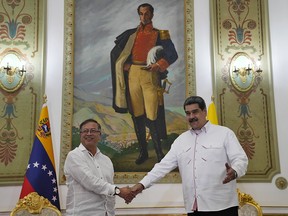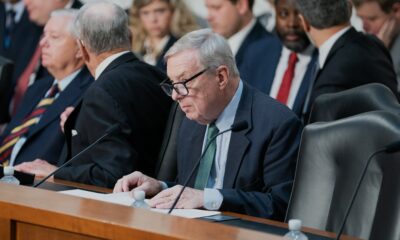World
Colombia’s President Proposes Union with Venezuela to Counter U.S. Tensions

Colombian President Gustavo Petro has proposed a controversial idea: a union between Colombia and Venezuela in response to increasing U.S. military presence in the Caribbean. This radical suggestion aims to recreate Gran Colombia, a republic established in 1821 that included present-day Colombia, Venezuela, Ecuador, and Panama. Although analysts have expressed skepticism about the feasibility of such a merger, the proposal highlights the deteriorating relations between Bogotá and Washington, historically Colombia’s closest ally.
Petro’s comments come amid escalating tensions with U.S. President Donald Trump, who has recently imposed sanctions on Petro and members of his administration, branding the Colombian leader “an illegal drug dealer” without providing evidence. In a passionate speech last week, Petro criticized Trump’s actions in South America, which have included military interventions and tariffs. He condemned the U.S. approach, stating, “America is not a continent of kings or princesses, princes or despots.” He called for a reconsideration of Gran Colombia as a means to resist U.S. aggression, drawing parallels to Simon Bolívar’s fight for independence from Spanish rule.
In a follow-up post on social media platform X, Petro reiterated his vision, proposing that the people of the region come together to realize the idea of Gran Colombia. He emphasized the need for unity in the face of perceived external threats.
Despite Petro’s consistent advocacy for the reconstruction of Gran Colombia, his interior minister, Armando Benedetti, has characterized the proposal as largely symbolic. Benedetti noted the challenges of merging multiple countries with established democracies, stating it’s “very difficult to imagine that five or six countries … will somehow come together to form a single country.”
Political analysts have echoed this sentiment. Sergio Guzmán, director of Colombia Risk Analysis, described the proposal as part of Petro’s longstanding aspirations and “pipe dreams.” Guzmán highlighted that this is not the first time Petro has invoked the idea of Gran Colombia, referencing his earlier remarks during Ecuadorian President Daniel Noboa’s inauguration.
Petro’s rhetoric surrounding Gran Colombia is deeply intertwined with his leftist ideology. According to Guzmán, the notion of regional unity and the legacy of Bolívar play significant roles in Petro’s political identity.
Relations between the U.S. and Colombia have sharply declined since Trump took office in January 2023. Issues ranging from deportations to drug policy have strained ties, culminating in September when the Trump administration began bombing alleged drug boats in the Caribbean, resulting in over 70 fatalities. Petro’s criticism intensified following these military actions, as he accused Trump of “murder” related to the boat strikes that he claimed killed an innocent fisherman.
The situation escalated further when Petro had his U.S. visa revoked after a visit to New York, during which he urged American troops to defy orders related to the conflict in Gaza. Following his remarks, Trump added Petro to the Clinton List of sanctioned individuals, freezing the U.S. assets of Petro, his family, and his minister.
With relations at a low point, Guzmán remarked that there is little room for further deterioration. He suggested that the current state of affairs is unlikely to improve, stating, “I don’t think it can get any worse … and I don’t think it’s gonna get any better.”
In summary, President Petro’s proposed union with Venezuela signals a significant shift in Colombia’s political landscape and reflects the growing rift between Colombia and the United States. The idea of Gran Colombia, while ambitious, faces practical challenges and skepticism from political figures and analysts alike.
-

 Politics1 week ago
Politics1 week agoSecwepemc First Nation Seeks Aboriginal Title Over Kamloops Area
-

 World4 months ago
World4 months agoScientists Unearth Ancient Antarctic Ice to Unlock Climate Secrets
-

 Entertainment4 months ago
Entertainment4 months agoTrump and McCormick to Announce $70 Billion Energy Investments
-

 Lifestyle4 months ago
Lifestyle4 months agoTransLink Launches Food Truck Program to Boost Revenue in Vancouver
-

 Science4 months ago
Science4 months agoFour Astronauts Return to Earth After International Space Station Mission
-

 Technology3 months ago
Technology3 months agoApple Notes Enhances Functionality with Markdown Support in macOS 26
-

 Top Stories1 month ago
Top Stories1 month agoUrgent Update: Fatal Crash on Highway 99 Claims Life of Pitt Meadows Man
-

 Sports4 months ago
Sports4 months agoSearch Underway for Missing Hunter Amid Hokkaido Bear Emergency
-

 Politics3 months ago
Politics3 months agoUkrainian Tennis Star Elina Svitolina Faces Death Threats Online
-

 Politics4 months ago
Politics4 months agoCarney Engages First Nations Leaders at Development Law Summit
-

 Technology4 months ago
Technology4 months agoFrosthaven Launches Early Access on July 31, 2025
-

 Top Stories3 weeks ago
Top Stories3 weeks agoFamily Remembers Beverley Rowbotham 25 Years After Murder




















